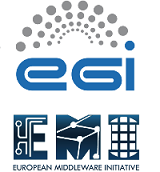Speakers
Overview
Aim of DECIDE (Diagnostic Enhancement of Confidence by an International Distributed Environment) is to design, implement, and validate a GRID-based e-Infrastructure building upon neuGRID and relying on the Pan-European backbone GEANT and the NRENs. Over this e-Infrastructure, a service will be provided for the computer-aided extraction of diagnostic markers for Alzheimer’s disease and schizophrenia from medical images. DECIDE will offer access to large distributed reference databases (850 and 2200 datasets from normal subjects and from neurological subjects, respectively), high computation and storage resources (more than 1000 CPU core processors and 70 Tbyte of storage) and intensive image processing tools. DECIDE will be open to the implementation of future algorithms based on other neuroimaging methods; in a longer-term perspective, the infrastructure could be extended to other research and diagnostic algorithms relating other diseases of the brain and other organ systems.
Impact
The potential impact for clinical use and research of the proposed e-infrastructure will be on a large scale, by enabling clinicians from hospitals with no access to sophisticated computational algorithms, computational resources, and large sets of reference images to carry out analyses remotely and efficiently by the use of a centralized user friendly web-Grid service. The service will be accessed by the medical community through a Science gateway portal.
The Project will define with National and European regulatory agencies protocols and rules for the qualification of experts enabled to use the service for clinical diagnostic purposes.
DECIDE will be open to the implementation of future algorithms based on other BioImaging methods; in a longer-term perspective, the infrastructure could be extended to other research and diagnostic algorithms relating other diseases of the brain and other organ systems.
URL
http://www.eu-decide.eu
Description of the work
DECIDE will offer access to large distributed reference databases (850 and 2200 datasets from normal subjects and from neurological subjects, respectively), high computation and storage resources (more than 1000 CPU core processors and 70 Tbyte) and intensive image processing tools:
(i) automated segmentation of hippocampal volume from structural magnetic resonance images to support the diagnosis of Alzheimer’s disease;
(ii) voxel-based statistical analysis of 18F-FDG positron emission tomography (PET) and Tc99-ECD single photon emission tomography (SPECT) to assess patterns of brain hypometabolism and hypoperfusion to support the diagnosis of Alzheimer’s disease;
(iii) spectral-based statistical analysis of electroencephalographic studies, used for the extraction of quantitative electrophysiological markers to support the diagnosis of Alzheimer’s disease;
(iv) pattern recognition analysis of functional neuroimaging studies, already assessed for the extraction of class-related biomarkers in the classification of schizophrenic patients with 18F-DOPA PET, and extended in this project for functional 18F-FDG-PET in neurodegenerative dementia.
The diagnostic markers extracted by tools (i) and (ii) are of established value in the medical community and might be used immediately in clinical settings, while (iii) and (iv) are in an earlier stage of validation, that will be brought forward by DECIDE.
The tools will be implemented into a Grid middleware that will allow: (i) authorization and secure access to largely distributed databases for reference images, (ii) computationally intensive processing, (iii) image processing on patient images residing locally, compliant with the strict data-sharing hospital policies.
Conclusions
DECIDE offers an innovative approach to the earlier diagnosis of neurodegeneration by exploiting distributed e-infrastructures and intends to immediately transfer its full potential from research to clinical praxis. Thus, the ambitious, ultimate goal is to change, in the short term, the way physicians perform their daily work and support them in clinical decisions, through the use of computer-aided extraction of biomarkers. In this way, the project will transfer to the whole medical community an opportunity nowadays available only to a restricted group of researchers.

